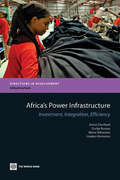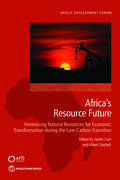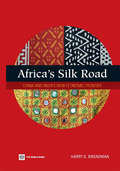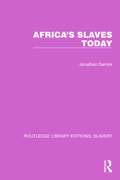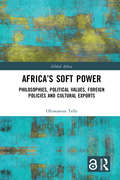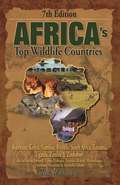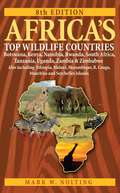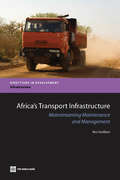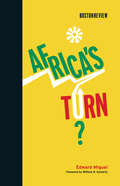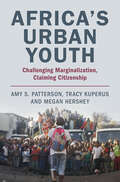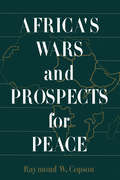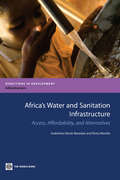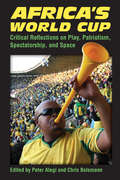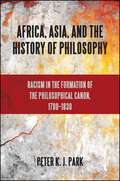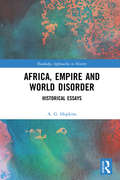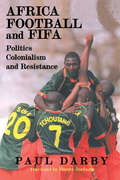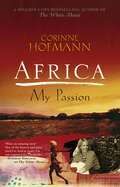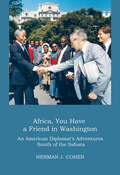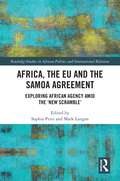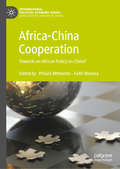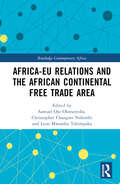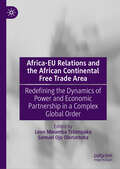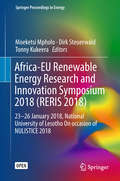- Table View
- List View
Africa's Power Infrastructure
by Anton Eberhard Orvika Rosnes Maria Shkaratan Haakon VennemoAfrica's chronic power problems have escalated in recent years into a crisis affecting 30 countries, taking a heavy toll on economic growth and productivity. The region has inadequate generation capacity, limited electrification, low power consumption, unreliable services, and high costs. It also faces a power sector financing gap on the order of $21 billion a year. It spends only about a quarter of what it needs to spend on power, much of this on operating expenditure required to run the continent's high-cost power systems, leaving little for the huge investments needed to provide a long-term solution. Further development of regional power trade would allow Africa to harness larger scale more cost-effective energy sources, reducing energy system costs by $2 billion a year and saving 70 million tons of carbon emissions annually. Economic returns to investments in cross-border transmission are particularly high. But reaping the promise of regional trade depends on a handful of major exporting countries raising the large volumes of finance needed to develop generation capacity for export. It would also require political will in a large number of importing countries that could potentially meet more than half their power demand through trade. Power sector inefficiencies are high, deterring investment in new capacity and electrification. There are three types of sector inefficiencies. First, there are utility inefficiencies, which include system losses, under-collection of revenue and over-manning. These result in a major waste of resources adding up to $4.40 billion a year. Under-collection is the largest component of utility inefficiencies amounting to $1.73 billion, following by system losses at $1.48 billion and by over-manning at $1.15 billion. The second type of sector inefficiency is under-pricing of power. By setting tariffs below the levels needed to cover the actual costs, SSA countries forego revenues of $3.62 billion a year. The third type of inefficiency is poor budget execution. Only 66% of the capital budgets allocated to power are actually spent, with about $258 million in public investment earmarked for the power sector being diverted elsewhere in the budget. Full cost recovery tariffs would already be affordable in countries with efficient large scale hydro or coal-based systems, but not in those relying on small scale oil-based plants. Once regional power trade comes into play, generation costs will fall, and full cost recovery tariffs could be affordable in much of Africa. One of the key policy challenges is to strengthen sector planning capabilities, too often overlooked in today's hybrid markets. A serious recommitment to reforming state-owned enterprises should emphasize improvements in corporate governance more than purely technical fixes. Improving cost recovery is essential for sustaining investments in electrification and regional power generation projects. Closing the huge financing gap will require improving the creditworthiness of utilities and sustaining the recent upswing in external finance to the sector This book is based on extensive data collection undertaken between 2006 and 2008 by the Africa Country Infrastructure Country Diagnostic, an initiative of the Infrastructure Consortium for Africa delegated to the World Bank under the guidance of the African Union, African Development Bank and other multi-lateral and bilateral development institutions.
Africa's Resource Future: Harnessing Natural Resources for Economic Transformation during the Low-Carbon Transition (Africa Development Forum)
by James Cust and Albert ZeufackThis book examines the role for natural resource wealth in driving Africa’s economic transformation and the implications of the low-carbon transition for resource-rich economies. Resource wealth remains central to most Sub-Saharan African economies, and significant untapped potential is in the ground. Subsoil assets—such as metals, minerals, oil, and gas—are key sources of government revenues, export earnings, and development potential in most countries in the Africa region. Despite large reserves, success in converting subsoil wealth into aboveground sustainable prosperity has been limited. Since the decline in commodity prices in 2014, resource-rich Africa has grown more slowly than the region’s average growth rate. Finding ways to more effectively harness natural resource wealth to drive economic transformation will be central to Africa’s economic future. As the world moves away from fossil fuels in alignment with commitments under the Paris Agreement, Africa’s resource-rich countries face new risks and opportunities. Recent estimates suggest that 80 percent of the world’s proven fossil fuel reserves must remain underground to meet the Paris targets, and much of these stranded reserves may be in Africa. This issue of stranded assets and, relatedly, “stranded nations,†? has major implications for the many African economies that are dependent on petroleum extraction and export. On the other hand, the energy transition will increase demand for raw material inputs involved in clean energy technologies. The transition from fossil fuels to clean energy may create demand by 2050 for 3 billion tons of minerals and metals that are needed to deploy solar, wind, and geothermal energy. How can African economies tap into these opportunities while managing the downside risk to their fossil fuel wealth? Africa’s Resource Future explores these themes and offers policy makers insights to help them navigate the coming years of uncertainty.
Africa's Silk Road: China and India's New Economic Frontier
by Harry G. BroadmanChina and India's new-found interest in trade and investment with Africa - home to 300 million of the globe's poorest people and the world's most formidable development challenge - presents a significant opportunity for growth and integration of the Sub-Saharan continent into the global economy. Africa's Silk Road finds that China and India's South-South commerce with Africa is about far more than natural resources, opening the way for Africa to become a processor of commodities and a competitive supplier of goods and services to these countries - a major departure from its long established relations with the North. A growing number of Chinese and Indian businesses active in Africa operate on a global scale, work with world-class technologies, produce products and services according to the most demanding standards, and foster the integration of African businesses into advanced markets.There are significant imbalances, however, in these emerging commercial relationships. These can be addressed through a series of reforms in all countries: 'At-the-border' reforms, such as elimination of China and India's escalating tariffs on Africa's leading exports, and elimination of Africa's tariffs on certain inputs that make exports uncompetitive 'Behind-the-border' reforms in Africa, to unleash competitive market forces and strengthen its basic market institutions 'Between-the-border' improvements in trade facilitation mechanisms to decrease transactions costs Reforms that leverage linkages between investment and trade, to allow African businesses to participate in global production networks that investments by Chinese and Indian firms can generate.
Africa's Slaves Today (Routledge Library Editions: Slavery #2)
by Jonathan DerrickAfrica’s Slaves Today, first published in 1975, examines the question of the persistence of slavery in modern Africa. It concludes that slavery is by no means dead in certain regions, but that at the same time clear-cut definitions of ‘slave’ and ‘free’ are often impossible to establish. In the Sahara particularly centuries of tradition involving slavery or semi-slavery have ensured a persistence of the status quo in all but name. Recent instances of Africans sold into slavery in Arabia are discussed, together with a detailed survey of slavery throughout North Africa and Ethiopia. At what stage forced labour becomes slavery is a difficult question raised by the discussion of the white South. The whole subject of slavery is put into perspective by contrasting examinations of the historical situation throughout the book.
Africa's Soft Power: Philosophies, Political Values, Foreign Policies and Cultural Exports (Global Africa)
by Oluwaseun TellaThis book investigates the ways in which soft power is used by African countries to help drive global influence. Selecting four of the countries most associated with soft power across the continent, this book delves into the currencies of soft power across the region: from South Africa’s progressive constitution and expanding multinational corporations, to Nigeria’s Nollywood film industry and Technical Aid Corps (TAC) scheme, Kenya’s sport diplomacy, fashion and tourism industries, and finally Egypt’s Pan-Arabism and its reputation as the cradle of civilisation. The book asks how soft power is wielded by these countries and what constraints and contradictions they encounter. Understandings of soft power have typically been driven by Western scholars, but throughout this book, Oluwaseun Tella aims to Africanise our understanding of soft power, drawing on prominent African philosophies, including Nigeria’s Omolúwàbí, South Africa’s Ubuntu, Kenya’s Harambee, and Egypt’s Pharaonism. This book will be of interest to researchers from across political science, international relations, cultural studies, foreign policy and African Studies.
Africa's Top Wildlife Countries
by Mark W. NoltingNavigating Africa can be daunting, particularly when planning a safari - an experience that varies greatly according to location. This guide demystifies the process, by detailing the safari stats of 18 African countries with maps, color photographs, illustrations of wildlife, 11 useful charts, and an accommodation guide with a detailed rating system.
Africa's Top Wildlife Countries
by Mark W. NoltingAFRICA'S TOP WILDLIFE COUNTRIES highlights and compares wildlife reserves and other major attractions in the continent's best countries for game viewing - making the planning of the journey of a lifetime easy! African countries, and the wildlife reserves within them, vary greatly as to the types and quality of safari experiences they offer. This is the only guidebook that effectively assists readers in choosing the best destinations for the kind of wildlife experience they would most enjoy by comparing travel options among all the top wildlife countries.Using the easy-to-read When's the Best Time to Go for Game Viewing chart, readers can conveniently choose the specific reserves and country(ies) that are best to visit during their vacation period. From the What Wildlife if Best Seen Where chart, readers can easily locate the reserves that have an abundance of the animals they wish to see. From the Safari Activities chart, readers can choose the reserves that offer the safari options (night drives, canoeing, walking, ballooning, etc.) that interest them most.Jam-packed with information essential to the successful safari:* 640 pages of color with over 575 photos* 15 Countries, including the top safari countries of Tanzania, Kenya, Uganda, Rwanda, Botswana, Zimbabwe, Zambia, Namibia and South Africa* Over 75 color maps, detailing countries and major wildlife reserves* 10 charts, including When's The Best Time to Go and What Wildlife is Best Found Where* Accommodations graded for convenient selectionDetailed information on:Photo SafarisMountain ClimbingGorilla and Chimpanzee SafarisBird WatchingCanoe/Kayak/Boat SafarisScuba Diving & SnorkelingHot-Air Balloon SafarisNight Game DrivesWalking SafarisWhite-water RaftingHorseback safarisFamily SafarisHoneymoon safaris
Africa's Trade Revisited
by Arvind Subramanian Natalia TamirisaThe popular impression that Africa has not integrated into world trade, as suggested by the evolution in simple indicators, has been callled into question recently by more formal analysis. This paper refines and generalizes this analysis, but lends supports to the popular view of disintegration. Africa, especially francophone Africa, is currently under-exploiting its trading opportunities and has witnessed disintegration over time, a trend that is most pronunced in its trade with the technologically advanced countries.
Africa's Transport Infrastructure
by Kenneth GwilliamThis book presents and analyzes the results of a comprehensive collection of data on the extent and condition of transport infrastructure in Sub-Saharan Africa, identifies the reasons for poor performance, and estimates future financing needs. The transport facilities of Sub-Saharan Africa were built primarily for the colonial exploitation of mineral and agricultural resources. The chief goal of road and rail networks was to link mines, plantations, and other sites for the exploitation and transformation on natural resources to ports, rather than to provide general connectivity within the region. The road network of 1.75 million kilometers exhibits a low density with respect to population. Its average spatial density is very low by world standards. The network carries low average traffic levels. Even so, because most African countries have a low GDP, the fiscal burden of the network is the highest among world regions, maintenance is underfinanced, and road conditions are on average poor, while road accident rates are very high. Attempts to improve the financing of maintenance through "second generation road funds" have met with some success, but there remain serious weaknesses in implementation. Road freight transport is fragmented, but cartelized, with high rates and high profits. Railways were also built mainly as for the exportation of minerals and crops. With the exception of two or three very specialized bulk mineral lines, the traffic volumes are low, and the railways have been in financial decline since the 1960s. Concessioning of the lines to private operators has improved performance, but governments often impose unachievable requirements on the companies, and investment remains inadequate for long-term sustainability. Most of the 260 airports that provide year-round commercial service in Sub-Saharan Africa have adequate runway capacity, though some of the larger airports suffer from a shortage of terminal capacity. More than a quarter of the runways are in marginal or poor condition, and air traffic control and navigation facilities are below international standards. Though airport charges are high, few airports are truly financially sustainable. Three national carriers are quite successful, but most are small and barely sustainable. Protection persists in the domestic and intercontinental markets, but the international market in the region has been effectively liberalized. The safety record is poor. Most ports are small by international standards. Many are still publicly owned and suffer from inadequate equipment and poor productivity. Only a few highly specialized ports, including private ports integrated with the extraction companies, meet the highest international standards Costs and charges are high. But there is a trend toward concessioning of facilities to large groups specializing in international container terminals and port operations. Fortunately the shipping market is now deregulated. Urban transport suffers from some infrastructure deficiencies, particularly in the condition of urban roads. But the main problems of the sector are associated with the fragmented and poorly regulated nature of most urban bus markets. Finance for large buses is very difficult to obtain. In all modes the situation is made worse by failures of governance in both the provision and regulation of infrastructure. The overall deficit in financing for infrastructure is estimated using a model based on the application of hypothesized standards of connectivity for all modal networks and facilities. Once the amount of infrastructure needed to meet those standards was calculated, these "requirements" were compared with existing stocks and the costs of making the transition over a ten-year period were calculated. A "base" scenario used standards similar to those pertaining in developed regions, while a "pragmatic" scenario applied lower standards. In a separate exercise, the actual average expenditures on transport infrastructure from all sources were researched. This allowed the funding gap to be deduced by subtraction....
Africa's Turn? (Boston Review Books)
by Edward MiguelSigns of hope in sub-Saharan Africa: modest but steady economic growth and the spread of democracy.By the end of the twentieth century, sub-Saharan Africa had experienced twenty-five years of economic and political disaster. While “economic miracles” in China and India raised hundreds of millions from extreme poverty, Africa seemed to have been overtaken by violent conflict and mass destitution, and ranked lowest in the world in just about every economic and social indicator. Working in Busia, a small Kenyan border town, economist Edward Miguel began to notice something different starting in 1997: modest but steady economic progress, with new construction projects, flower markets, shops, and ubiquitous cell phones. In Africa's Turn? Miguel tracks a decade of comparably hopeful economic trends throughout sub-Saharan Africa and suggests that we may be seeing a turnaround. He bases his hopes on a range of recent changes: democracy is finally taking root in many countries; China's successes have fueled large-scale investment in Africa; and rising commodity prices have helped as well. Miguel warns, though, that the growth is fragile. Violence and climate change could derail it quickly, and he argues for specific international assistance when drought and civil strife loom. Responding to Miguel, nine experts gauge his optimism. Some question the progress of democracy in Africa or are more skeptical about China's constructive impact, while others think that Miguel has underestimated the threats represented by climate change and population growth. But most agree that something new is happening, and that policy innovations in health, education, agriculture, and government accountability are the key to Africa's future.ContributorsOlu Ajakaiye, Ken Banks, Robert Bates, Paul Collier, Rachel Glennerster, Rosamond Naylor, Smita Singh, David N. Weil, and Jeremy M. Weinstein
Africa's Urban Youth: Challenging Marginalization, Claiming Citizenship
by Amy S. Patterson Tracy Kuperus Megan HersheyMaking up 65 percent of Africa's population, young people between the ages of 18 and 35 play a key role in politics, yet they live in an environment of rapid urbanization, high unemployment rates and poor state services. Drawing from extensive fieldwork in Ghana, Uganda and Tanzania, this book investigates how Africa's urban youth cultivate a sense of citizenship in this challenging environment, and what it means to them to be a 'good citizen'. In interviews and focus group discussions, African youth, activists, and community leaders vividly explain how income, religion, and gender intertwine with their sense of citizenship and belonging. Though Africa's urban youth face economic and political marginalization as well as generational tensions, they craft a creative citizenship identity that is rooted in their relationships and obligations both to each other and the state. Privileging above all the voice and agency of Africa's young people, this is a vital, systematic examination of youth and youth citizenship in urban environments across Africa.
Africa's Wars and Prospects for Peace
by Raymond W. CopsonA collection of articles addressing the issue of whether the industrial model of human progress can be sustained in the long term. It asks what the social, political, economic and environmental implications as well as potential solutions to the problem of resource-intensive growth are.
Africa's Water and Sanitation Infrastructure
by Sudeshna Ghosh Banerjee Elvira MorellaThe welfare implications of safe water and sanitation cannot be overstated. The economic gains from provision of improved services to millions of unserved Africans in enormous. The international adoption of Millennium Development Goals brought the inadequacies of service provision sharply into focus. With only 58% and 31% enjoying access to water and sanitation services respectively, Sub-Saharan Africa is the only continent that is off-track in achieving the MDGs in 2015. The problem is compounded by the fact that a rigorous and credible baseline did not exist on coverage to improved water and sanitation and resources required to meet the MDGs. This book aims to contribute to this gap by collecting a wealth of primary and secondary information to present the most up-to-date and comprehensive quantitative snapshot of water and sanitation sectors. The book evaluates the challenges to the water and sanitation sectors within the urban and rural areas and deepen our understanding of drivers of coverage expansion in the context of financing, institutional reforms, and efficiency improvements. Finally, the book establishes the investment needs for water and sanitation with a target of meeting the MDGs and compares with the existing financing envelopes, disaggregated by proportions that can be recouped by efficiency gains and net financing gaps. The directions for the future draw on lessons learned from best practices and present the menu of choices available to African countries. There is no recipe book that neatly lays out the possible steps the country should adopt to enhance coverage and quality of service. The challenges differ to a significant extent among African countries and solutions must be tailored to individual national or regional conditions.
Africa's World Cup: Critical Reflections on Play, Patriotism, Spectatorship, and Space
by Peter Chris Alegi BolsmannAfrica s World Cup: Critical Reflections on Play, Patriotism, Spectatorship, and Space focuses on a remarkable month in the modern history of Africa and in the global history of football. Peter Alegi and Chris Bolsmann are well-known experts on South African football, and they have assembled an impressive team of local and international journalists, academics, and football experts to reflect on the 2010 World Cup and its broader significance, its meanings, complexities, and contradictions. The World Cup s sounds, sights, and aesthetics are explored, along with questions of patriotism, nationalism, and spectatorship in Africa and around the world. Experts on urban design and communities write on how the presence of the World Cup worked to refashion urban spaces and negotiate the local struggles in the hosting cities. The volume is richly illustrated by authors photographs, and the essays in this volume feature chronicles of match day experiences; travelogues; ethnographies of fan cultures; analyses of print, broadcast, and electronic media coverage of the tournament; reflections on the World Cup s private and public spaces; football exhibits in South African museums; and critiques of the World Cup s processes of inclusion and exclusion, as well as its political and economic legacies. The volume concludes with a forum on the World Cup, including Thabo Dladla, Director of Soccer at the University of KwaZulu-Natal, Mohlomi Kekeletso Maubane, a well-known Soweto-based writer and a soccer researcher, and Rodney Reiners, former professional footballer and current chief soccer writer for the Cape Argus newspaper in Cape Town. This collection will appeal to students, scholars, journalists, and fans. Cover illustration: South African fan blowing his vuvuzela at South Africa vs. France, Free State Stadium, Bloemfontein, June 22, 2010. Photo by Chris Bolsmann. "
Africa, Asia, and the History of Philosophy: Racism in the Formation of the Philosophical Canon, 1780–1830 (SUNY series, Philosophy and Race)
by Peter K. ParkWinner of the 2016 Frantz Fanon Prize for Outstanding Book in Caribbean Thought presented by the Caribbean Philosophical AssociationIn this provocative historiography, Peter K. J. Park provides a penetrating account of a crucial period in the development of philosophy as an academic discipline. During these decades, a number of European philosophers influenced by Immanuel Kant began to formulate the history of philosophy as a march of progress from the Greeks to Kant—a genealogy that supplanted existing accounts beginning in Egypt or Western Asia and at a time when European interest in Sanskrit and Persian literature was flourishing. Not without debate, these traditions were ultimately deemed outside the scope of philosophy and relegated to the study of religion. Park uncovers this debate and recounts the development of an exclusionary canon of philosophy in the decades of the late eighteenth and early nineteenth centuries. To what extent was this exclusion of Africa and Asia a result of the scientization of philosophy? To what extent was it a result of racism?This book includes the most extensive description available anywhere of Joseph-Marie de Gérando's Histoire comparée des systèmes de philosophie, Friedrich Schlegel's lectures on the history of philosophy, Friedrich Ast's and Thaddä Anselm Rixner's systematic integration of Africa and Asia into the history of philosophy, and the controversy between G. W. F. Hegel and the theologian August Tholuck over "pantheism."
Africa, Empire and World Disorder: Historical Essays (Routledge Approaches to History)
by A. G. HopkinsThis volume brings together important articles from the Cambridge historian A. G. Hopkins and reflect the enlargement and evolution of historical studies during the last half century. The essays cover four of the principal historiographical developments of the period: the extraordinary revolution that has led to the writing of non-Western indigenous history; the revitalization of new types of imperial history; the now ubiquitous engagement with global history, including a reinterpretation of American Empire, and the current revival of economic history after several decades of neglect.
Africa, Football and FIFA: Politics, Colonialism and Resistance (Sport in the Global Society #10)
by Paul DarbyThis book explores the role of FIFA in brokering the development of football in Africa and its relationship with that continent's football associations and regional governing body. Africa is no longer on the periphery of world football but the economic disparities between the first and the third worlds hinder the development of the game. The author shows convincingly how Africa's advance within world football is tied to its national political economy and how the balance of power within FIFA still clearly favours its European members.
Africa, My Passion
by Corinne HofmannIn an exquisite personal pilgrimage, Corinne Hofmann delves into the slums of Nairobi to uncover the heart-warming and heart-breaking stories of unforgettable people and places, then treks 500 miles across the Namibian desert to discover the lives of the nomadic Himba people. Joined by her half-Kenyan daughter, Napirai, they travel to Nairobi together for the first time to discover Napirai s roots and finally meet her father and half-siblings. Africa, My Passion is a poignant, touching and exciting story about one woman's love affair with a unique man, which led to a lifelong obsession with Africa. Moving, vividly recounted, eye-opening and, above all, filled with passionate hope and unparalleled detail, this is an extraordinary sequel to a bestselling series of memoirs.
Africa, My Passion
by Corinne HofmannIn an exquisite personal pilgrimage, Corinne Hofmann delves into the slums of Nairobi to uncover the heart-warming and heart-breaking stories of unforgettable people and places, then treks 500 miles across the Namibian desert to discover the lives of the nomadic Himba people. Joined by her half-Kenyan daughter, Napirai, they travel to Nairobi together for the first time to discover Napirai s roots and finally meet her father and half-siblings. Africa, My Passion is a poignant, touching and exciting story about one woman's love affair with a unique man, which led to a lifelong obsession with Africa. Moving, vividly recounted, eye-opening and, above all, filled with passionate hope and unparalleled detail, this is an extraordinary sequel to a bestselling series of memoirs.
Africa, You Have a Friend in Washington: An American Diplomat's Adventures South of the Sahara
by Herman J. CohenDuring nineteen years of overseas duty in the Foreign Service, the author served in five U.S. embassies in Africa, including a term as ambassador to the Republic of Senegal. The book highlights the author’s experiences south of the Sahara, both as Foreign Service officer and as assistant secretary of state for Africa in the George H. W. Bush administration. It is a source of useful information for American university students or recent graduates who are considering pursuing careers in the international sector.
Africa, the EU and the Samoa Agreement: Exploring African Agency Amid the ‘New Scramble’ (Routledge Studies in African Politics and International Relations)
by Mark Langan Sophia PriceThis edited volume provides a timely and critical analysis of Africa‑EU Relations in the new Samoa Agreement phase of the long‑standing ‘Eurafrican’ relationship.Drawing on a range of critical perspectives and contributions it moves beyond Eurocentric visions of policy co‑operation on development to highlight three core themes that frame the analysis within this volume: the new scramble for Africa, Europe’s ontological security and the securitisation of development and African agency. In doing so, it assesses EU actors’ engagement with African institutions in relation to key areas of policy collaboration, including trade, development, health, migration and security. In this context, it examines whether the ‘partnership’ offers African states and regional institutions a genuine pathway to ‘development’ or whether historical power asymmetries remain entrenched – and perhaps even exacerbated – through the new Africa‑EU Agreement.This book will be of key interest to scholars, students and practitioners involved in Development Studies, EU studies, Africa‑EU Relations, African politics and International Relations and more broadly to International Political Economy and Comparative Regionalism.
Africa-China Cooperation: Towards an African Policy on China? (International Political Economy Series)
by Philani Mthembu Faith MaberaThis book offers a range of perspectives on the Africa–China partnership in the context of the Forum on China and Africa Cooperation (FOCAC). Incorporating historical, political, social and cultural dimensions, it offers innovative views on the Africa–China relationship that combine theory and practice, and critically examines the prospects of a Pan-African policy towards China, complementary to China’s comprehensive African policy. The chapters address a number of key questions, including: What steps are being taken to achieve a more coordinated approach and policy towards China on the African continent? Does Africa even need a collective strategy in the first place? How would a coherent policy framework affect Africa’s relations with Europe and other external partners? How do the pillars of the partnership align with the African Union’s Agenda 2063 and the United Nation’s 2030 Agenda for Sustainable Development?
Africa-EU Relations and the African Continental Free Trade Area (Routledge Contemporary Africa)
by Samuel Ojo Oloruntoba, Christopher Changwe Nshimbi and Leon Mwamba TshimpakaThis book explores relations between states in the Africa–European Union in view of the African Continental Free Trade Area, both at a regional level and as a series of informal processes of socioeconomic and political interactions between state and non-state actors. The book reconsiders the ways in which actors in the Africa–European Union relationship function, and what that means for regionalism, regionalisation and regional integration. In addition to formalised state-to-state and inter-regional interactions, the book examines the impact of socio-economic and political interactions with non-state actors, including those who engage with regional integration through formal and informal processes such as civil society activists, “African migration evangelists”, human smugglers and human traffickers. The book thus demonstrates that regional and inter-regional engagements include issues that extend beyond the usual discussions of trade. The book is authored from an African perspective and will be of interest to academics who specialise in International Relations, Political Economy, Political Sociology and African Studies. Policy makers and various actors in civil society and think tanks who have an academic inclination and deal with trade, migration and regionalism in Africa and Africa’s relations with Europe will also find the book beneficial.
Africa-EU Relations and the African Continental Free Trade Area: Redefining the Dynamics of Power and Economic Partnership in a Complex Global Order
by Samuel Ojo Oloruntoba Leon Mwamba TshimpakaThis book examines the establishment and implementation of the AfCFTA, which is the largest free trade area globally, covering 54 African countries. It explores how this initiative has the potential to reshape Africa-EU relations by promoting intra-African trade, economic integration, and diversification, as well as inter- regional trade. Both continents have potential to serve as global actors in reshaping the global order in ways that can affect how multilateralism foster inclusive development. However, whether this will happen would be a function of how the EU and AU define their interests and relationship.
Africa-EU Renewable Energy Research and Innovation Symposium 2018: 23–26 January 2018, National University of Lesotho On occasion of NULISTICE 2018 (Springer Proceedings in Energy)
by Moeketsi Mpholo Dirk Steuerwald Tonny KukeeraThis open access book presents the proceedings of the 2nd Africa-EU Renewable Energy Research and Innovation Symposium (RERIS 18), held in Maseru, Lesotho in January 2018. The symposium aimed to foster research cooperation on renewable energy between Africa and Europe – in academia, as well as the private and public sectors. Addressing thematic areas such as• Grid-connected renewable energy;• Decentralised renewable and household energy solutions;• Energy socioeconomics; and• Promotion of energy research, innovation, education and entrepreneurship,the book brings together contributions from academics and practitioners from the EU and Africa to enable mutual learning and knowledge transfer – a key factor in boosting sustainable development in the African renewable energy market. It also plays a significant role in promoting African renewable energy research, which helps to secure energy supply in both rural and urban areas and to increase generation capacities and energy system resilience. This book is an invaluable resource for academics and professionals across the renewable energy spectrum.
